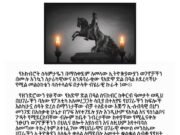The Paradox of Press Freedom in Ethiopia: A Tale of Two Narratives
By LJDemissie
Seventeen western embassies in Addis Ababa released a joint statement on this occasion, advocating for the release of these journalists and the creation of a world where journalists can report freely and without fear of persecution.
In response, the Ministry of Foreign Affairs of the Federal Democratic Republic of Ethiopia (MFA) released a statement. They noted that Ethiopia upholds the freedom of the press, which must be exercised and protected within the confines of the rule of law. They also mentioned the unprecedented growth of traditional and digital media outlets in the country, demonstrating the full enjoyment of this fundamental right.
However, the experiences of some suggest a different narrative. Despite MFA’s claim on Ethiopia’s commitment to press freedom, there are reports of individuals being blocked from official social media accounts, including those of Prime Minister Abiy Ahmed (@AbiyAhmedAli) and Minister of Foreign Affairs Ato Taye Atske (@TayeAtske), for constructive criticism. Upholding press freedom means allowing open dialogue, but these actions seem to contradict this principle.
Concerns have also been raised about the relentless derogatory posts by Ato Daniel Kibret, Advisor Minister on social affairs to the Prime Minister of Ethiopia, using official accounts which is his personal Twitter account (@danielkibret). Critics and dissenters are relentlessly being called the most offensive names the Amharic language offers, with such posts appearing on his Twitter account at least once a week or so, and they are even being metaphorically roasted. This behavior, which provokes and inflames rather than encourages constructive dialogue, raises questions about the state of press freedom in the country. It also raises questions about the lack of rules, policies, and social media standards for government officials.
The author believes that PM Abiy is fully aware of his advisor’s unprofessional and undiplomatic social media behavior. His silence on making his advisor post professional and diplomatic posts is appalling.
Indeed, it appears that PM Abiy Ahmed’s administration promotes dialogue; however, all dialogues are not treated equally. Activities that promote PM Abiy’s agenda have been getting awards from various Ethiopian institutions, including the Ethiopian National Defence Forces. However, a constructive critical supporter such as this author is banned from PM Abiy’s Twitter account (@AbiyAhmedAli).
Furthermore, I am aware of reports that social media journalists have been arrested by the Ethiopian government. Some of these journalists have been accused of attempting to provoke unrest in Ethiopia, and there have been instances of social media disinformation and misinformation campaigns I’ve witnessed against PM Abiy and Ethiopia’s peace. It’s important to note that freedom of the press includes the right to criticize and question the government’s actions. However, the specifics of Ethiopia’s press freedom rules and the circumstances surrounding these arrests are beyond my knowledge.
Additionally, since Ethiopia doesn’t have rules, policies, and standards of conduct for government officials’ social media accounts ownership, control, data management, and activities, PM Abiy’s administration officials use their own personal social media accounts for official purposes, and they retain data when they change roles. The advisor, who also acts as an activist, frequently engages in behavior that includes posting derogatory language towards critics and dissenters.
As we reflect on these events, it’s important to remember that the path to true press freedom is paved with open dialogue, respect for dissenting voices, and adherence to the rule of law. Only then can we hope to create a world where journalists can report freely and without fear of persecution.
The writer, LJDemissie, who received assistance from AI technology developed by OpenAI, can be reached at LJDemissie@yahoo.com or on Twitter at @LJDemissie.
























